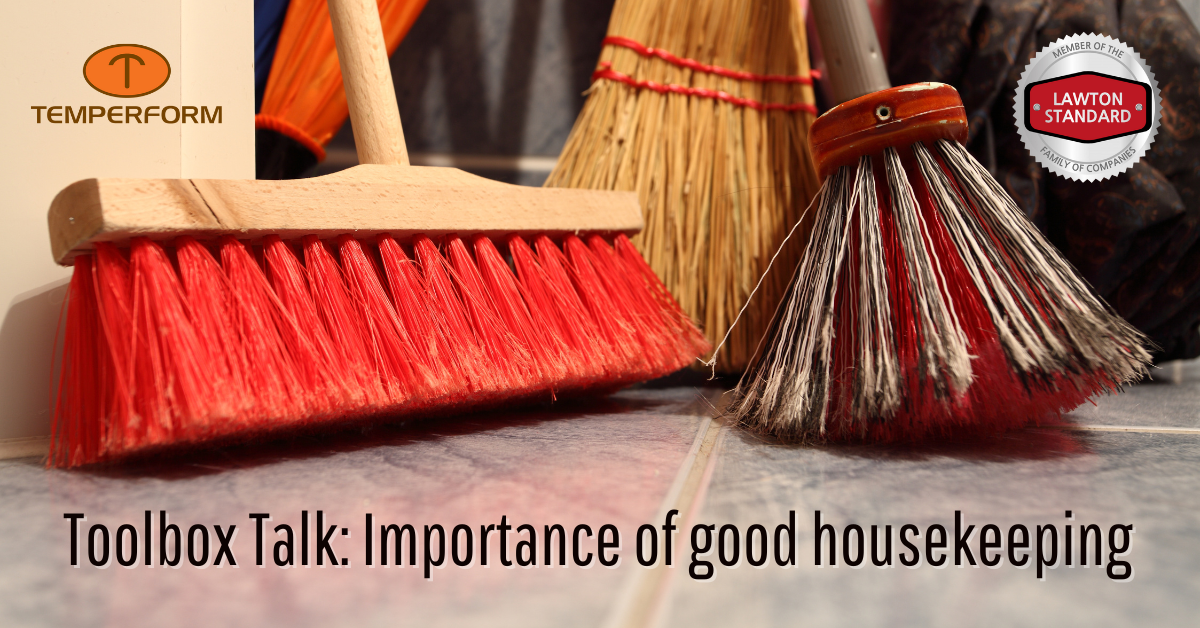 At The Lawton Standard companies, we’ve noticed a theme with our Good Catches. Many of them are housekeeping-related: broken pallet pieces in walkways, banding on the ground, tools not being put away. We share the responsibility of keeping our workplace safe. A clean workplace is a safe workplace.
At The Lawton Standard companies, we’ve noticed a theme with our Good Catches. Many of them are housekeeping-related: broken pallet pieces in walkways, banding on the ground, tools not being put away. We share the responsibility of keeping our workplace safe. A clean workplace is a safe workplace.
Below is an article adapted from a workers’ compensation website we shared in a recent Toolbox Talk. It addresses the importance of good housekeeping (https://www.pinnacol.com/knowledge-center/safety-talk-housekeeping-is-safekeeping-at-work). It reminds us of the impact of poor housekeeping on businesses, employers, and employees. Please consider how you can contribute to a cleaner, safer workplace.
Why is housekeeping important?
Housekeeping at work is as essential as at home, especially if you want to work in a safe workplace. People who try to function daily in a messy, disorderly work environment have lower morale and a higher chance of getting hurt. The safety ramifications of poor housekeeping in the workplace are critical. Poor housekeeping may result in employee injuries or even death, citations by the Occupational Safety and Health Administration (OSHA), and difficulty securing profitable, future work.
How can such a seemingly “minor” issue, such as housekeeping, have serious consequences? Poor housekeeping practices can result in:
- Injuries when employees trip over, strike, or are struck by out-of-place objects.
- Lowered production because of the time spent steering around someone else’s mess and looking for proper tools and materials.
- Injuries from improper tools because the correct tool can’t be found.
- Lack of future work due to a reputation for poor quality.
Remember: If you are complacent about housekeeping, you may become desensitized to poor practices and become unable to identify hazards, putting yourself at risk of injury.
General housekeeping rules and tips to remember:
- Follow the routine cleaning schedule.
- Clean up after yourself. Pick up trash and debris and dispose of them properly. Keep your work area clean throughout the day, minimizing the time needed to clean up a larger mess at the end of the day.
- Put away or dispose of combustibles and flammables properly to prevent the potential for a fire.
- Remove protruding nails and other sharp objects or hammer them flat to prevent someone from being injured.
- Stack materials and supplies orderly and secure them so they won’t fall over.
- Keep walkways free of debris, cords, cables, and storage items.
- Clean up oil, water, and grease on floors immediately.
- Ensure floor strips, mats, or floor pads are kept in good condition (no curled or frayed edges).
- Wear proper footwear for your work environment.
- Return equipment and tools to their proper storage location when done with equipment and tools.
Benefits of good housekeeping
The apparent benefits of good housekeeping are a workplace we can all be proud of and safe, healthy, happy, and efficient employees. Other positives you may not have thought of include:
- Not spending time investigating and reporting accidents that could have been avoided
- Avoid fires due to improper storage and disposal of flammable or combustible materials and wastes
- Dissatisfied customers caused by poor quality castings due to production schedule delays, defects, ill-equipped employees
- “Wall-to-wall” OSHA inspections triggered by the “first impression” of the compliance officer
In closing, housekeeping is everyone’s responsibility. Let’s hold each other accountable and take care of each other. A well-kept workplace shows respect for all of us who work here. When finishing a task, clean up and put things back in order. Use the 6S concepts of safety, sort, set in order, shine, standardize, and sustain.
Keep the Good Catches coming! Good Catches are essential. You and your safety are important. Don’t take risks with your safety or someone else’s. Inform your supervisor immediately if you get hurt. Help implement corrective actions to prevent future injuries. Please think about your role and how you contribute to a safe work environment. Thank you.